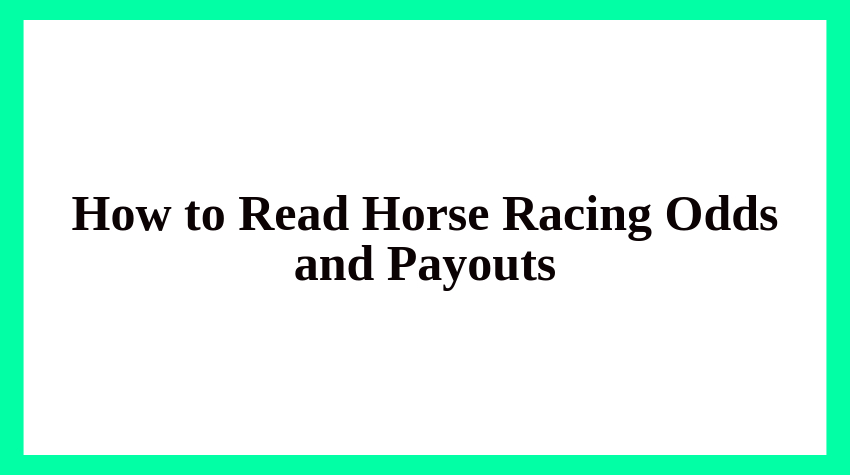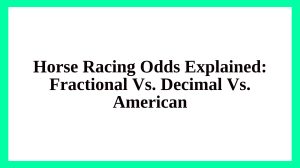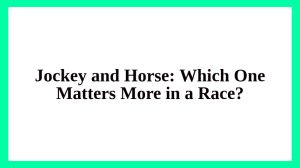Horse racing is one of the most thrilling and popular sports for betting. Whether you’re watching the Kentucky Derby, the Melbourne Cup, or a local race, understanding how to read horse racing odds and how they determine your payouts is crucial for making informed betting decisions. Horse racing odds not only represent the likelihood of a horse winning, but they also dictate the amount you stand to win if you make a successful bet.
If you’re new to horse racing and want to learn more about the basics of the sport, it’s a great idea to first familiarize yourself with what horse racing is. Understanding the fundamental rules and how races are conducted will provide you with a solid foundation for betting strategies. Once you’re comfortable with the basics, we’ll explain how to read horse racing odds, how they are calculated, and how to understand the potential payouts for different types of bets. With this knowledge, you can improve your betting strategy and make smarter decisions on your next wager.
What Are Horse Racing Odds?
Understanding the Basics of Horse Racing Odds
Horse racing odds indicate the likelihood of a horse winning a race. Odds are determined by various factors, including the horse’s past performance, the jockey’s skill, track conditions, and how the horse is viewed by the bookmakers and bettors. Essentially, the odds reflect how much you can potentially win relative to the amount you wager.
- Odds and Probability: Odds represent probability. For example, if a horse has 3/1 odds, it means that for every ¥1 you wager, you stand to win ¥3 if the horse wins, plus your original wager. In simpler terms, the higher the odds, the less likely the horse is to win, and the higher the payout.
- Types of Odds: Horse racing odds are typically expressed in fractional format (e.g., 3/1 or 5/2) in most markets, but you may also encounter decimal odds or moneyline odds, depending on the location or online platform you use.
Different Formats for Horse Racing Odds
- Fractional Odds: These are the most common odds used in horse racing, especially in the UK and Ireland. For example, 5/1 means that for every ¥1 you bet, you win ¥5 if the horse wins.
- Decimal Odds: In countries like Canada and Europe, decimal odds are often used. Decimal odds represent the total payout (your original bet plus your winnings). For example, 6.00 odds means you will receive ¥6 for every ¥1 bet, including your original wager.
- Moneyline Odds: Moneyline odds are typically used in the United States. For example, +300 means you win ¥300 for every ¥100 you bet, while -200 means you need to bet ¥200 to win ¥100.
Calculating Payouts in Horse Racing
How to Calculate Payouts with Fractional Odds
Fractional odds are common in horse racing, and calculating the potential payout is simple. The first number represents how much you can win from a bet, while the second number is how much you need to stake to win that amount.
- Formula:
Payout = (Bet Amount x Fractional Odds) + Bet Amount
For example, if you place a ¥1,000 bet at 5/1 odds:- Your potential winnings would be ¥1,000 x 5 = ¥5,000.
- The total payout (including your original bet) would be ¥5,000 + ¥1,000 = ¥6,000.
How to Calculate Payouts with Decimal Odds
Decimal odds are easier to calculate than fractional odds, as they represent the total amount you’ll receive for every ¥1 wagered. To calculate your potential payout, simply multiply your bet by the decimal odds.
- Formula:
Payout = Bet Amount x Decimal Odds
For example, if you place a ¥1,000 bet at 6.00 odds:- Your potential payout would be ¥1,000 x 6.00 = ¥6,000 (including your initial ¥1,000 bet).
Moneyline Odds and Payout Calculation
Moneyline odds are often used in the United States and are expressed as either positive (+) or negative (-) numbers.
- Positive Moneyline Odds: If the odds are +300, you win ¥300 for every ¥100 you bet.
- Formula:
Payout = (Bet Amount x (Moneyline Odds / 100)) + Bet Amount- Example: A ¥1,000 bet at +300 odds would give a payout of ¥1,000 + (¥1,000 x 3) = ¥4,000.
- Formula:
- Negative Moneyline Odds: If the odds are -200, you need to wager ¥200 to win ¥100.
- Formula:
Payout = (Bet Amount / (Moneyline Odds / 100)) + Bet Amount- Example: A ¥1,000 bet at -200 odds would give a payout of ¥1,000 + (¥1,000 / 2) = ¥1,500.
- Formula:
Types of Horse Racing Bets and Their Payouts
Win, Place, and Show Bets
The simplest and most common bets in horse racing are Win, Place, and Show.
- Win Bet: You bet on a horse to win the race. If the horse wins, you receive a payout based on the odds.
- Payout: If you place a ¥1,000 win bet at 5/1 odds, your payout would be ¥6,000 (¥5,000 in winnings + your ¥1,000 stake).
- Place Bet: You bet on a horse to finish in the top 2 positions (in races with more than 2 horses). If your horse finishes in either first or second place, you win.
- Payout: The payout for a place bet is typically lower than for a win bet because the odds are more favorable (more horses can finish in the top 2).
- Show Bet: You bet on a horse to finish in the top 3 positions. This bet has the highest likelihood of winning, but the payout is the smallest.
- Payout: A show bet on a horse with 5/1 odds might give you a smaller payout than a win bet, but the chances of winning are higher.
Exotic Bets: Exacta, Trifecta, and Superfecta
Exotic bets offer higher payouts but are also riskier. These bets involve predicting the exact order of finishes for the top horses.
- Exacta: You bet on the first and second-place horses in the exact order. This is one of the most common exotic bets.
- Payout: Exacta bets have higher odds than win or place bets, but they can also be quite difficult to win.
- Trifecta: You bet on the first, second, and third-place horses in the exact order.
- Payout: The trifecta has even higher odds than the exacta, and the payout can be substantial if you pick the right horses.
- Superfecta: You bet on the first four finishers in the exact order.
- Payout: Superfecta bets offer the highest payouts in horse racing due to their complexity and low probability of success.
Factors Affecting Horse Racing Odds
Past Performance and Form
The form of a horse plays a significant role in determining its odds. A horse with a strong history of wins and good performance in recent races is likely to have lower odds, reflecting its higher likelihood of winning.
- Recent Wins: Horses that have been performing well in recent races are often favored by bookmakers, leading to lower odds.
- Track Record: Horses that have performed well on similar tracks or conditions may have better odds for success.
Jockey and Trainer Influence
The jockey and trainer are key factors in determining the odds. Skilled jockeys and experienced trainers can influence a horse’s chances of winning.
- Jockey Skill: A top-tier jockey can make a huge difference, especially in close races. Jockeys with a strong record can improve a horse’s odds.
- Trainer Reputation: The trainer’s ability to get the best performance out of a horse is factored into the odds. A horse trained by a high-profile trainer may be seen as more likely to win.
How to Make Informed Betting Decisions Using Odds
Using Form and Odds to Your Advantage
Before placing a bet, study the form of the horses and compare the odds. Look for horses with solid performance records and favorable odds. If a horse has a strong recent performance and competitive odds, it might be a smart bet.
Managing Your Bankroll
When betting on horse racing, it’s important to manage your bankroll wisely. Start by setting a budget for how much you’re willing to risk, and don’t exceed that limit.
- Set Limits: Only bet an amount you can afford to lose. Keep in mind that horse racing is unpredictable, and even the favorites can lose.
- Bet Strategically: Mix your bets between safer options like win and place, and riskier exotic bets when the payout is worth the risk.
Conclusion: Understanding Horse Racing Odds for Smarter Betting

\ Place Your Bets and Gallop Towards Victory! /
Horse racing odds are a crucial part of the betting experience. By understanding how they are calculated, how to interpret them, and how they affect potential payouts, you can make smarter and more informed betting decisions. Whether you prefer simple bets like win, place, or show, or you’re interested in more complex exotic bets, understanding the odds is essential for successful betting.
If you’re ready to start applying this knowledge, head over to Casino Savvy, where you can explore horse racing betting tips, odds guides, and more to enhance your betting strategy.









Comments